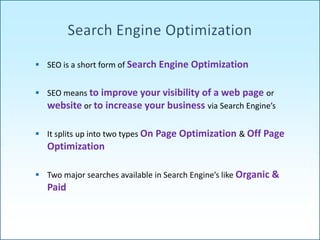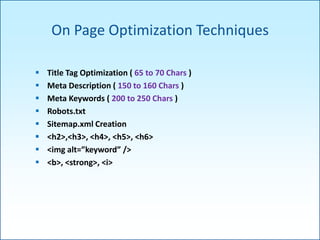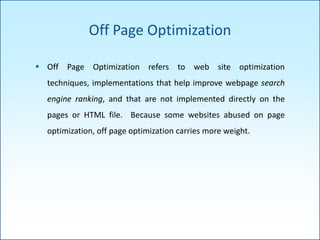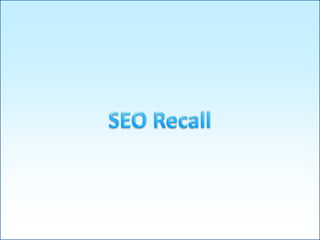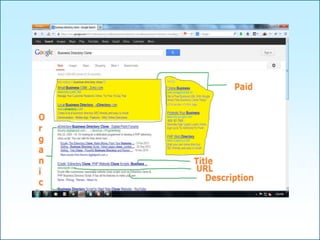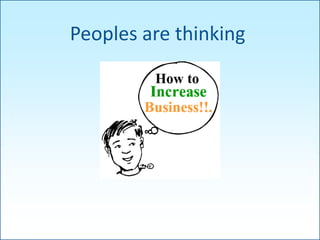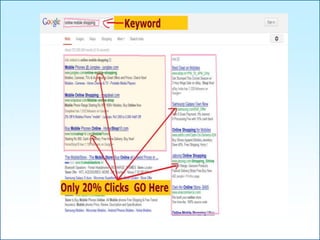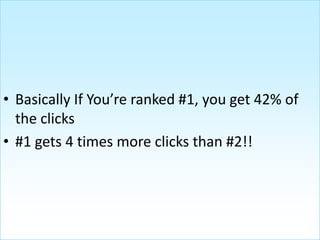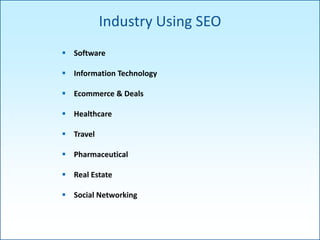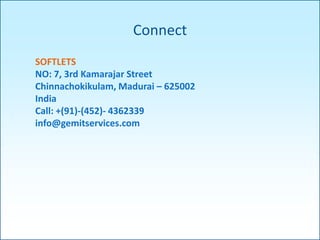Search Engine Optimization, Organic & Paid Search
- 1. Introduction To Search Engine Optimization
- 2. CONTENTS Define Search Engine Search Engine Optimization On Page Optimization Off Page Optimization Organic Search Paid Search SEO Recall Why SEO? Who are all using SEO Social Shares Connect
- 3. A Search Engine is a software system that is designed to search for information on the WWW A Search Engine is really a general class of programs, however, the term is often used to specifically describe systems like Google, Bing and Yahoo! Search that enable users to search for documents on the World Wide Web.
- 4. SEO is a short form of Search Engine Optimization SEO means to improve your visibility of a web page or website or to increase your business via Search Engine’s It splits up into two types On Page Optimization & Off Page Optimization Two major searches available in Search Engine’s like Organic & Paid
- 5. On Page Optimization On Page Optimization refers to using specific terms in a webpage to achieve higher Search Engine Rankings. The terms could be updated on the visible parts of the page (what the viewer normally sees) or in the code that creates the page (what the viewer does not see). All Optimization is completed directly in the HTML file or page or “on page”.
- 6. On Page Optimization Techniques Title Tag Optimization ( 65 to 70 Chars ) Meta Description ( 150 to 160 Chars ) Meta Keywords ( 200 to 250 Chars ) Robots.txt Sitemap.xml Creation <h2>,<h3>, <h4>, <h5>, <h6> <img alt=”keyword” /> <b>, <strong>, <i>
- 7. Off Page Optimization Off Page Optimization refers to web site optimization techniques, implementations that help improve webpage search engine ranking, and that are not implemented directly on the pages or HTML file. Because some websites abused on page optimization, off page optimization carries more weight.
- 8. Off Page Optimization Techniques Directory Submission Social Bookmarking Article Submission Press Release Submission Classified Submission Blog Posting Guest Posting Commenting
- 9. Organic Search Organic search results are listings on search engine results pages that appear because of their relevance to the search terms, as opposed to their being advertisements. In contrast, non-organic search results may include pay per click advertising.
- 10. Paid Search Paid Search: In contrast, non-organic search results may include pay per click advertising.
- 16. • Brand Awareness • Targeted Traffic • Long Term Cost Benefit • Brand Credibility • Competitors Reason
- 17. • 70% of clicks for a particular search on are organic • 70-80% of searchers are ignoring the paid ads • 75% of users never click past the first page of results • 18% of organic clicks go to the #1 position, 10% of organic clicks go to the #2 position, and 7% of organic clicks go to the #3 position. • 79% of search engine users say they always/frequently click on the natural search results So, Why Use SEO
- 20. How Important is being on the 1st page of results
- 21. • Basically If You’re ranked #1, you get 42% of the clicks • #1 gets 4 times more clicks than #2!!
- 22. Industry Using SEO Software Information Technology Ecommerce & Deals Healthcare Travel Pharmaceutical Real Estate Social Networking
- 24. Social Media is the new player Shares Likes Comments Followers RTs/Mentions Links
- 25. Connect SOFTLETS NO: 7, 3rd Kamarajar Street Chinnachokikulam, Madurai – 625002 India Call: +(91)-(452)- 4362339 info@gemitservices.com




